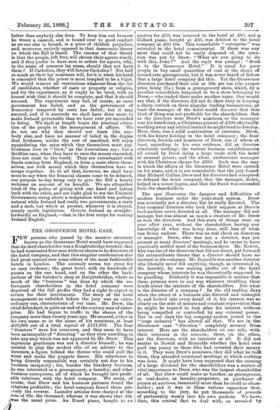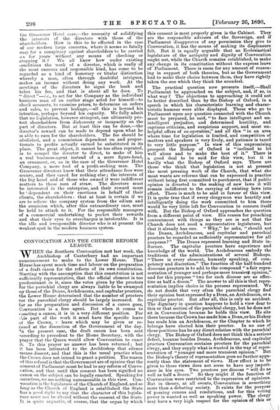THE GROSVENOR HOTEL CASE.
FEW persons who passed by the massive structure known as the Grosvenor Hotel would have supposed that its chief shareholder was a Knightsbridge butcher, that he had nominated four men without shares to be directors of the hotel company, and that this singular combination also had great control over some others of the most fashionable hotels in London. The anomaly seems too great for an easy credence ; the great hotel, with its hundreds of guests on the one hand, and on the other the back- parlour of the butcher's shop at Knightsbridge, where so much of the " business " was done by which the un- fortunate shareholders in the hotel company were deprived of the full profits they had a right to expect in return for their investments. The story of the hotel management as unfolded before the jury was an extra- ordinary one, characteristic of our time. Mr. Drew, the chief defendant, is quite an end-of-the-century man of enter- prise. He had begun to traffic in the shares of the company more than twenty years ago. He secured, either in his own name or in the name of his nominees, at least £60,000 out of a total capital of £111,000. The four "directors" were his creatures, and they seem to have been as incapable of " directing " as they were unwilling to take any step which was not approved by Mr. Drew. This ingenious gentleman was not a director himself; he was content to play the modest role of an adviser to the directors, a figure behind the throne who could pull the wires and make the puppets dance. His reluctance to being directly responsible was certainly not due to his business incapacity ; for, besides the butchery business, he was interested in a greengrocery, a laundry, and other business enterprises, all of which he brought into profit- able relations with the hotel company. We mean, of course, that Drew and his business partners found the relations profitable ; the hotel company found them pre- eisely the reverse. Laundry articles were charged at the rate of 60s. the thousand, whereas it was shown that 40s. auction for £50, was invoiced to the hotel at £85, ands. Collard piano, bought at £45, was debited to the hotel company at £60 10s. This remarkable " enterprise " was- extended to the hotel commissariat. If there was any meat that could not be easily disposed of, the ques- tion was put by Drew : " What are you going to do- with this, John ?" And the reply was prompt : "Send it to the Grosvenor Hotel." It is usual for poor people to buy small quantities of coal at the shops of second-rate greengrocers, but it was never heard of before. that a large hotel company did this. Yet the Grosvenor- directors purchased their coal at 30s. per ton (the proper price being 25s.) from a greengrocery store, which, by a. peculiar coincidence, happened to be a store belonging to- Drew,—who traded. there under another name. One would say that, if the directors did not do their duty in keeping a sharp outlook on these singular trading transactions, at least the manager of the hotel would discover that this kind of thing was not profitable for the shareholders. But as the directors were Drew's nominees, so the manager was his beneficiary, a Christmas present of £100 effectually soothing away any critical instinct he might tend to develop.. Here, then, was a solid combination of interests. Drew,. with his heavy holding in the hotel company ; the four directors, friends and nominees of Drew, one of whom at least, according to his own evidence, did as director absolutely nothing ; the various business establishments all owned by Drew doing a large trade with the hotel at unusual prices ; and the silent, unobservant manager with his Christmas cheque for £100. Such was the war in which the affairs of the Grosvenor Hotel were carried, on for years, and it is not remarkable that the jury found that Richard Collins Drew and his directors had conspired to defraud the hotel company, that the manager, Zeder, helped in a minor degree, and that the fraud was concealed from the shareholders.
The case illustrates the dangers and difficulties of modern business under the joint-stock system. Drew was nominally not a director, but he really directed. The: four nominal directors who took their suppers at Drew's back-parlour never directed at all. The manager did not manage, but was almost as much a creature of Mr. Drew as were the directors. And this state of things went OIL year after year, without the shareholders having any knowledge of what was being done, still less of what was being undone. There was no real check on directors or manager. Drew, who was not a director, was yet present at many directors' meetings, and he seems to have- practically settled most of the business there. Mr. Newitt, who was one of the directors that did not direct, put forward the extraordinary theory that a director should have no interest in the company. Mr. Reynolds was another director who literally never did anything, though, as interested in the laundry, he was making profits out of the hotel, company whose interests he was theoretically supposed to. be guarding. Evidently it was impossible to assume that these persons were in any way whatever troubling their- heads about the interests of the shareholders. But what. is the director of a company ? In the old trading days when the owner of a business also directed and managed it, and looked into every detail of it, his interest was so clearly on the side of minute and constant supervision that. he might be trusted to look after his interest without being compelled or controlled. by any external power.. But in our days the big company system joined to the- " large industry " has altered all that. We see in the Grosvenor case " direction " completely severed front interest. Here are the shareholders on one side, with, their interests in the concern; there, on the other,. are the directors, with no interests at all. It did not matter to Newitt and Reynolds whether the hotel ever paid one penny to those who had invested their money in it. They were Drew's nominees, they did what he told them, they attended occasional meetings at which nothing was done. It might have been supposed. that the earning of a large dividend for the shareholders was a matter of vital importance to Drew, who was the largest shareholder of all. But Drew could make as butcher, as greengrocers,. as coal-dealer, as laundry-proprietor, as purchaser of pianos at auctions, immensely more than he could as share- holder ; and it was in these various capacities that. according to the jury, he put thousands of pounds of partnership money into his own pockets. We have, then, this central fact to deal with, as revealed by the Grosvenor Hotel case,—the necessity of solidifying the interests of the directors with those of the 'shareholders. How is this to be effected in the case of our modern large concerns, where it seems so fatally -easy for a conspiracy against shareholders to be carried ell for years without any means of checking or .stopping it ? We all know how under existing .conditions the work of a director, which is really of the most onerous and responsible kind, has come to be regarded as a kind of honorary or titular distinction whereby a man, often through doubtful intrigues, makes an income without doing any work. At the meetings of the directors he signs the book and takes his fee, and that is about all he does. To -4' direct "—i.e., to act for the Company as the individual business man of an earlier stage acted for himself—to check accounts, to examine prices, to determine on orders and sales, to prevent leakage,—all this is beyond his intention, perhaps beyond his capacity. We fully admit that no legislation, however stringent, can ultimately pro- tect shareholders from dishonesty or incapacity on the part of directors. But at least this can be done,—the .director's reward can be made to depend upon what he is able to earn for the shareholders. The fee should be abolished, and a commission dependent on and propor- tionate to profits actually earned be substituted in its place. The great object, it cannot be too often repeated, is to compel the director to direct, to make of him a real business-agent instead of a mere figure-head, en ornament, or, as in the case of the Grosvenor Hotel 'Company, a mere tool of a profit-seeking man. The Grosvenor directors knew that their attendance fees were secure, and they cared for nothing else ; the interests of the big hotel and of those who owned it were indifferent matters to these men of straw. The directors must be interested in the enterprise, and their reward must be !dependent on their exertions in behalf of their clients, the shareholders : that at least is certain if we are to relieve the company system from the odium and the suspicion which, after this extraordinary case, must be held to attach to it. For the responsible managers of a commercial undertaking to pocket their rewards and shut their eyes to overcharges is intolerable. It is the idle and irresponsible director who is at present the 'weakest spot in the modern business system.







































 Previous page
Previous page